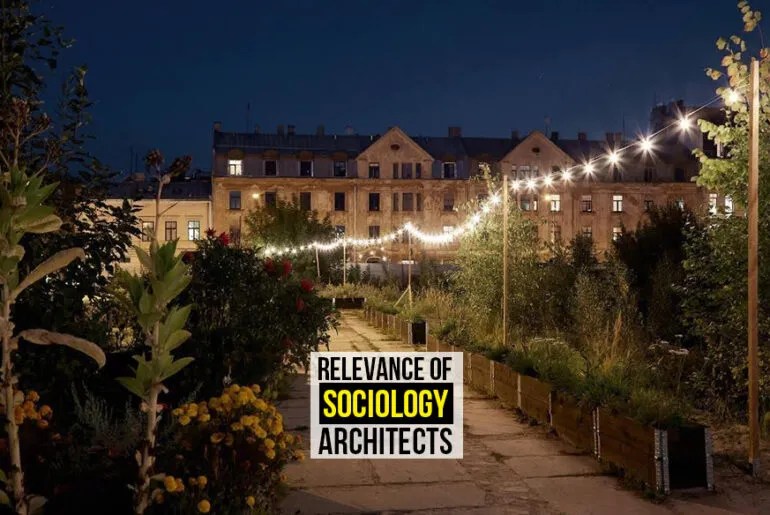Humans interact with the built environment in numerous ways and this helps in establishing relations, viewpoints, and ideas. A city’s infrastructure has a significant role in shaping identities and this may occasionally become a society’s historical legacy. Similar to metropolitan societies, our mental image of a rural society is characterized by a type of architecture. Each of these societies has a distinct architectural style that varies with regions and generations, affecting the people and how they organize themselves. Therefore, it is crucial to comprehend the significance of architecture and the role that the physical environment plays in influencing society and vice versa.
Society is abstract
Sociology is a systematic and scientific study of society. It examines the constituent parts of societies such as institutions, communities, and demographics to understand their dynamics. Sociology as a subject involves the study of various factors such as social movements, status, change, and disorders. A society by definition is a group of people who live in a defined geographic region, who socially interact with one another, and may or may not share a common culture. A society consists of social relations, customs, laws, and more. It depends on ethnicity, religion, and the environment. These social relations are abstract, intangible, cannot be seen or touched, and can only be realized; making abstractness an element of society. The advantages of a society are that it promotes teamwork, teaches cooperation, brings in synergy, and provides a balance between independence and interdependence. The disadvantages are that it sets norms that curb individual growth and uses coercive methods for compliance with social norms.

Social Architecture is a balancing act
The relationship between man-made surroundings and society is unique. This area is believed to be a subset of classical architectural sociology, which examines the development of human civilizations, the expansion of infrastructure, and how it relates to the dynamics of social connections. The field of sociocultural associations encompasses anything from a household to a local community or a school. The sociology of architecture studies how a school building affects a child’s behavior or how a park’s design affects a child’s conduct. Social architecture examines how cultural structures, paintings, patterns, and artefacts affect human conduct. A learner may behave differently in a classroom with dynamic designs than in one with static features. Hence, the field is important as it helps understand both past, & current interactions and behaviors as well as the role that architecture will play in society going forward.

Social Architecture Projects
Several projects in the recent past have brought about both a quantitative and qualitative change in the society thereby promoting social changes through architecture in the sense that it is for the community, by the community, and of the community. A biennale project of the Centre of Contemporary Culture of Barcelona (CCCB), the urban community garden Sporta Pils Darzi, or the ‘Garden of Sporta Pils’, was one of the five finalists for the 2022 edition of the European Prize for public space. The privately owned land was held vacant since 2008, when plans to build a residential complex were shelved due to financial crises. It serves as an illustration of how community involvement can transform an abandoned plot into an open green space for social gatherings. During the covid lockdown, Renate Lagzdina, the founder and project director of Sporta Pils Darzi, noticed that the neighborhood lacked large open spaces. This inspired her to come up with the idea of creating a communal garden, which became successful because of the involvement of the local citizens and community. The land subsequently transformed into an urban garden to inspire the residents of Riga (Latvia) to actively participate in the growth and development of their city.


The Book Stop Project in Manilla, Philippines is a pop-up library that explores how libraries need to evolve to promote reading in the next generations. It encourages community events and serves three components: social, research, and a program prototype. The project puts the emphasis back on a library’s primary functions such as a location to read and find books, a social gathering place for people, and an educational tool. Rather than being a massive, monolithic structure housing a vast collection, the Book Stop Project is a network of transportable venues dotted across the city, each drawing significantly more foot traffic than an average library. The project avoids attempting to reimagine the role of libraries in a contemporary world when the selection of books available online surpasses that of any library or bookstore. Rather, it aims to reimagine the distribution mechanism and physical layout of libraries, with a focus on accessibility and casual serendipity.


Reference list:
Dr. Rizvi, B.A. / B.Sc. Sem-II (Anthropology) Paper-III Unit-I Characteristics of Society.
Form, William, and Robert E.L. Faris. “Sociology | Definition, History, Examples, & Facts.” Encyclopedia Britannica, 14 Mar. 2019, www.britannica.com/topic/sociology.
“Sociology of Architecture or Architectural Sociology – Overview.” Sociology Group: Sociology and Other Social Sciences Blog, 29 June 2021, www.sociologygroup.com/architecture/.
“The Book Stop Project.” WTA, 6 Dec. 2019, wtadesignstudio.com/the-book-stop-project/.
world, STIR. “Sporta Pils Dārzi”: The Story of Developing a Community Garden from Nothing.” Www.stirworld.com, www.stirworld.com/see-features-sporta-pils-darzi-the-story-of-developing-a-community-garden-from-nothing.


















